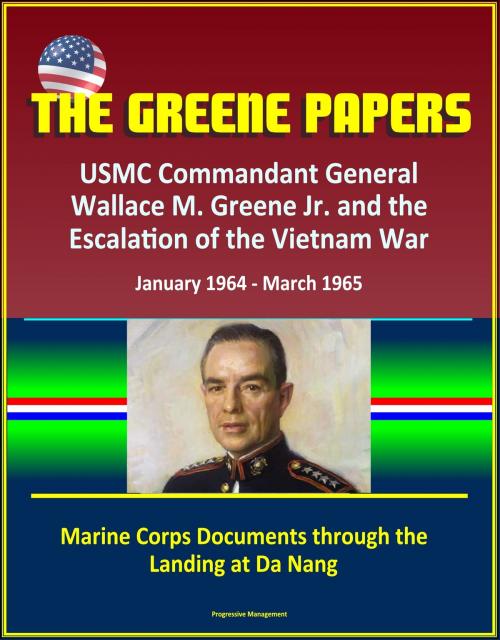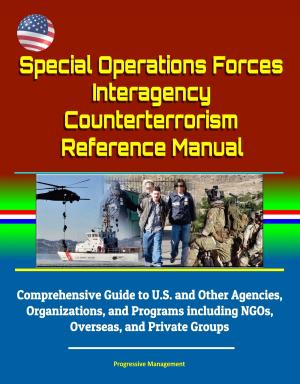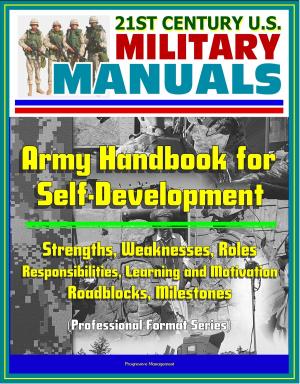The Greene Papers: USMC Commandant General Wallace M. Greene Jr. and the Escalation of the Vietnam War, January 1964 - March 1965 - Marine Corps Documents through the Landing at Da Nang
Nonfiction, History, Asian, Southeast Asia, Military, Vietnam War| Author: | Progressive Management | ISBN: | 9781370366934 |
| Publisher: | Progressive Management | Publication: | January 28, 2017 |
| Imprint: | Smashwords Edition | Language: | English |
| Author: | Progressive Management |
| ISBN: | 9781370366934 |
| Publisher: | Progressive Management |
| Publication: | January 28, 2017 |
| Imprint: | Smashwords Edition |
| Language: | English |
This excellent report has been professionally converted for accurate flowing-text e-book format reproduction. General Wallace M. Greene was only the fourth Commandant of the Marine Corps to serve as a member of the Joint Chiefs of Staff. Upon the start of his tenure in January 1964, he believed he had a twofold mission: to lead the Marine Corps as its senior officer and to serve as a counselor to the president of the United States as a Service chief. Greene's efforts to complete the latter part of his mission were repeatedly stymied by a president, Lyndon B. Johnson, who was uneasy around the military and a secretary of defense, Robert S. McNamara, who often believed that the Joint Chiefs lacked the political and diplomatic skills needed for understanding the world of the Cold War.
Greene nevertheless made every effort he could to see that his opinions on military matters reached President Johnson. This was particularly so during the run-up to the United States' intervention in the Vietnam War. As the Johnson administration debated the various courses of action available to the United States in Southeast Asia, Greene took down copious notes from every meeting he attended, saved cables and memoranda, and worked to lay a documentary foundation for future historical works on the Marine Corps and the Vietnam War. Most of these documents remained classified until 2011, when the Marine Corps History Division and the Marine Corps Archives worked to declassify them and make them available for research. This volume presents, in edited form, the bulk of that material from January 1964 until just before the landing of Marine units in South Vietnam in March 1965.
This collection is a point of departure for the Marine Corps History Division. In the past, the History Division has published primary sources and other historical documents as occasional papers; the present work contains the first edited volume of personal papers to be printed by the division as a monograph. The volume includes more than 100 documents from the personal papers of General Wallace M. Greene, Commandant of the Marine Corps from 1964-67. As Commandant during the critical early years of direct U.S. involvement in the Vietnam War, Greene played an important role in the decision-making process as the United States escalated its role in the conflict. He was also afforded a remarkable vantage point and was an eyewitness to some of the most important decisions made by President Lyndon B. Johnson during this period.
These papers have been collected and edited for both research purposes and to chronicle the events of this period of escalation; they begin right before the Khanh coup of January 1964 and end just prior to the landing of Marines at Da Nang in March 1965. The majority of the documents come from notes, memoranda, letters, and cables collected by Greene under the title "Notes on the Situation in South Vietnam." They also include a substantial oral history recorded by General Greene for the Historical Division (as History Division was then known) between 1971 and 1972. These papers comprised about 15 archival boxes and were kept classified until 2011.
This excellent report has been professionally converted for accurate flowing-text e-book format reproduction. General Wallace M. Greene was only the fourth Commandant of the Marine Corps to serve as a member of the Joint Chiefs of Staff. Upon the start of his tenure in January 1964, he believed he had a twofold mission: to lead the Marine Corps as its senior officer and to serve as a counselor to the president of the United States as a Service chief. Greene's efforts to complete the latter part of his mission were repeatedly stymied by a president, Lyndon B. Johnson, who was uneasy around the military and a secretary of defense, Robert S. McNamara, who often believed that the Joint Chiefs lacked the political and diplomatic skills needed for understanding the world of the Cold War.
Greene nevertheless made every effort he could to see that his opinions on military matters reached President Johnson. This was particularly so during the run-up to the United States' intervention in the Vietnam War. As the Johnson administration debated the various courses of action available to the United States in Southeast Asia, Greene took down copious notes from every meeting he attended, saved cables and memoranda, and worked to lay a documentary foundation for future historical works on the Marine Corps and the Vietnam War. Most of these documents remained classified until 2011, when the Marine Corps History Division and the Marine Corps Archives worked to declassify them and make them available for research. This volume presents, in edited form, the bulk of that material from January 1964 until just before the landing of Marine units in South Vietnam in March 1965.
This collection is a point of departure for the Marine Corps History Division. In the past, the History Division has published primary sources and other historical documents as occasional papers; the present work contains the first edited volume of personal papers to be printed by the division as a monograph. The volume includes more than 100 documents from the personal papers of General Wallace M. Greene, Commandant of the Marine Corps from 1964-67. As Commandant during the critical early years of direct U.S. involvement in the Vietnam War, Greene played an important role in the decision-making process as the United States escalated its role in the conflict. He was also afforded a remarkable vantage point and was an eyewitness to some of the most important decisions made by President Lyndon B. Johnson during this period.
These papers have been collected and edited for both research purposes and to chronicle the events of this period of escalation; they begin right before the Khanh coup of January 1964 and end just prior to the landing of Marines at Da Nang in March 1965. The majority of the documents come from notes, memoranda, letters, and cables collected by Greene under the title "Notes on the Situation in South Vietnam." They also include a substantial oral history recorded by General Greene for the Historical Division (as History Division was then known) between 1971 and 1972. These papers comprised about 15 archival boxes and were kept classified until 2011.















